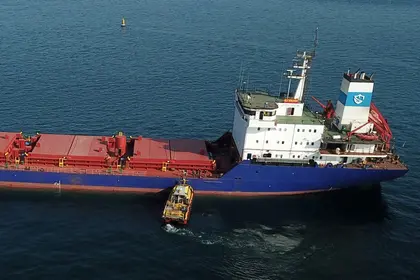More ships carrying Ukrainian grain were scheduled to sail south from the Ukrainian port of Odesa on Wednesday, Nov. 2, under the terms of a UN-negotiated Black Sea safe corridor, with the region’s biggest naval power, Turkey, politely dismissing several days of Kremlin warnings that Russia could no longer “secure” the convoys because it was pulling out of the grain transit agreement.
The Kremlin has, in the meantime, reversed course a full 180 degrees on Wednesday, Nov. 2, declaring it would remain a participant in the grain corridor process, after receiving what is described as “guarantees” from Ukraine.
JOIN US ON TELEGRAM
Follow our coverage of the war on the @Kyivpost_official.
On Saturday, Oct. 29, five days earlier, no less than President Vladimir Putin himself said Russia was quitting the deal. At the time, he said no grain shipments of any kind should exit Ukrainian ports, and that Russia could not support them. The Russian leader’s announcement spiked world grain prices and renewed international concerns of hunger in food-vulnerable nations dependent on Ukrainian wheat.
The July 22 Black Sea Grain Initiative (BSFI) agreement calls for UN-flagged cargo ship convoys carrying Ukrainian grain and other products to international markets via a safe corridor and multilateral inspection guaranteeing no transport of arms or other military materials. Ukraine, Turkey, Russia and the UN are participants in the deal.
To date, reportedly, over 380 ships have departed to some 37 countries, transporting over 8.6 million tons of cargo from Ukrainian ports. Kenya, Afghanistan, Bangladesh, Yemen, Ethiopia, and Somalia are particularly dependent on Ukrainian grain shipments. Ukraine is the second-largest wheat supplier to Turkey, after Russia
Multiple Russian officials said on Saturday, Oct. 29 that Ukrainian attacks against Russian warships made it impossible for Moscow to “guarantee” the safety of the civilian grain convoys in the future.
“If something happens to one of them [civilian cargo ships carrying Ukrainian grain], then it will be our fault,” Putin insisted in comments made at a St. Petersburg conference on Tuesday, Nov. 1, widely covered by Russian state-controlled media. Kremlin spokesman Dmitriy Peskov said on Oct. 30 that the grain corridor would be “dangerous” and probably unable to function without Russian security guarantees.
Turkish Defense Minister Hulusi Akar said at a Nov. 1 news conference that Ankara would continue to respect the terms of the grain safe transit agreement, even without Russia. He made clear ships protected by the Turkish navy would keep on hauling Ukraine grain, telling reporters in comments published by the Defense Ministry “There is no problem in the exit of the Turkish flagged ships there [in Ukraine]. They will continue to exit [Ukrainian ports].”
Ankara was aware of Moscow’s concerns and has communicated them to Kyiv, he said.
Oleksandr Kubrakov, Ukraine’s Minister of Infrastructure, in a Wednesday, Nov. 2 Tweet said a convoy of eight ships would set sail on Thursday, Nov. 3.
Russia began an all-out invasion of Ukraine on Feb. 24 intending to score a quick victory, but the war has dragged on. Ukraine used anti-ship missiles to sink the Russian Black Sea Fleet’s flagship, the cruiser Moskva, on Apr. 14. Since then Russian warships have rarely ventured far from their home port of Sevastopol, in the Crimea peninsula.
Russia’s reputation as a major naval power took a further hit last weekend, on Oct. 29, when a swarm of Ukrainian kamikaze drones in a spectacular sea raid hit and damaged at least two BSF warships off shore of Sevastopol port.
Independent analysts pointed to Black Sea naval power balances as a key factor in Ankara’s decision to help Ukraine export grain, and secure cargo ships carrying the goods, in the face of Kremlin warnings about “threats to security” in the Black Sea basin. The Turkish navy is at least four times bigger than Russia’s Black Sea Fleet, and far more battle-capable due to more modern equipment and NATO-standard training, according to most regional security estimates.
Yörük Işık, an analyst of the Middle East Institute, said in a Wednesday, Nov. 2 TV interview on France 24 that “Russia doesn’t have any naval assets. At the beginning of the war, Russia had naval assets in the western Black Sea. So far, what we witness, is the ultimate collapse of Russian Armed Forces. Their Black Sea Fleet commander is fired. They cannot bring out their ships. Their ships are getting hunted in their headquarters. How are they enforcing this blockade? If they had military assets – OK. But they have nothing!”
The Russian Defense Ministry said on Wednesday, Nov. 2, that it was resuming its participation in the Ukraine grain deal because it had received “sufficient” guarantees from Kyiv on demilitarizing the maritime corridor.
You can also highlight the text and press Ctrl + Enter



